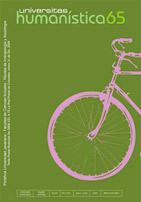Resumo
Este artigo desenvolve uma crítica ao livro Império de Hardt e Negri. O mesmo está baseado nas pesquisas do autor sobre a descolonização dos paradigmas da economia política. A primeira parte do ensaio é um resumo dos conceitos básicos usados no texto, tais como colonialidade, corpo-política e geo-política do conhecimento e diferença colonial. Em seguida é feita uma discussão crítica em relação à visão linear eurocêntrica de Lenin no que toca o «imperialismo» e à visão «etapista» em Marx, no que diz respeito aos processos de «acumulação do capital». Finalmente, discute-se como o livro Impériode Hardt e Negri está inscrito em uma narrativa linear eurocêntrica leninista que oculta os processos de colonialidade do poder a escala mundial.
A revista Universitas Humanística encontra-se registada sob a licencia Creative Commons Versão 4.0 Internacional. Portanto, esta obra pode se reproduzir, distribuir e comunicar publicamente em formato digital, sempre que dado o crédito apropriado para os autores e a Pontificia Universidad Javeriana. Permite-se citar, adaptar, remixar, transformar, autoarquivar, republicar e criar a partir do material, para qualquer fim, mesmo que comercial, sempre que indicado apropriadamente o nome do criador, provido um link para a obra original e indicado se mudanças foram feitas. A Pontificia Universidad Javeriana não retém os direitos sobre as obras publicadas e os conteúdos são responsabilidade exclusiva dos autores, os quais conservam seus direitos morais, intelectuais, de privacidade e publicidade.
O aval sobre a intervenção da obra (revisão, correção, edição, tradução, formatação) e a subsequente difusão disponibiliza-se através de licença de uso e não através de transmissão de direitos, o que representa que a revista e a Pontificia Universidad Javeriana são isentas de qualquer responsabilidade que puder se derivar de uma prática ética pobre por parte dos autores. Em consequência da proteção fornecida pela licença de uso, a revista não fica na obrigação de publicar retratações ou alterar informações já publicadas, a não ser que a errata seja decorrente do processo de gestão editorial. A publicação de conteúdos nesta revista não representa royalties para os contribuintes.


